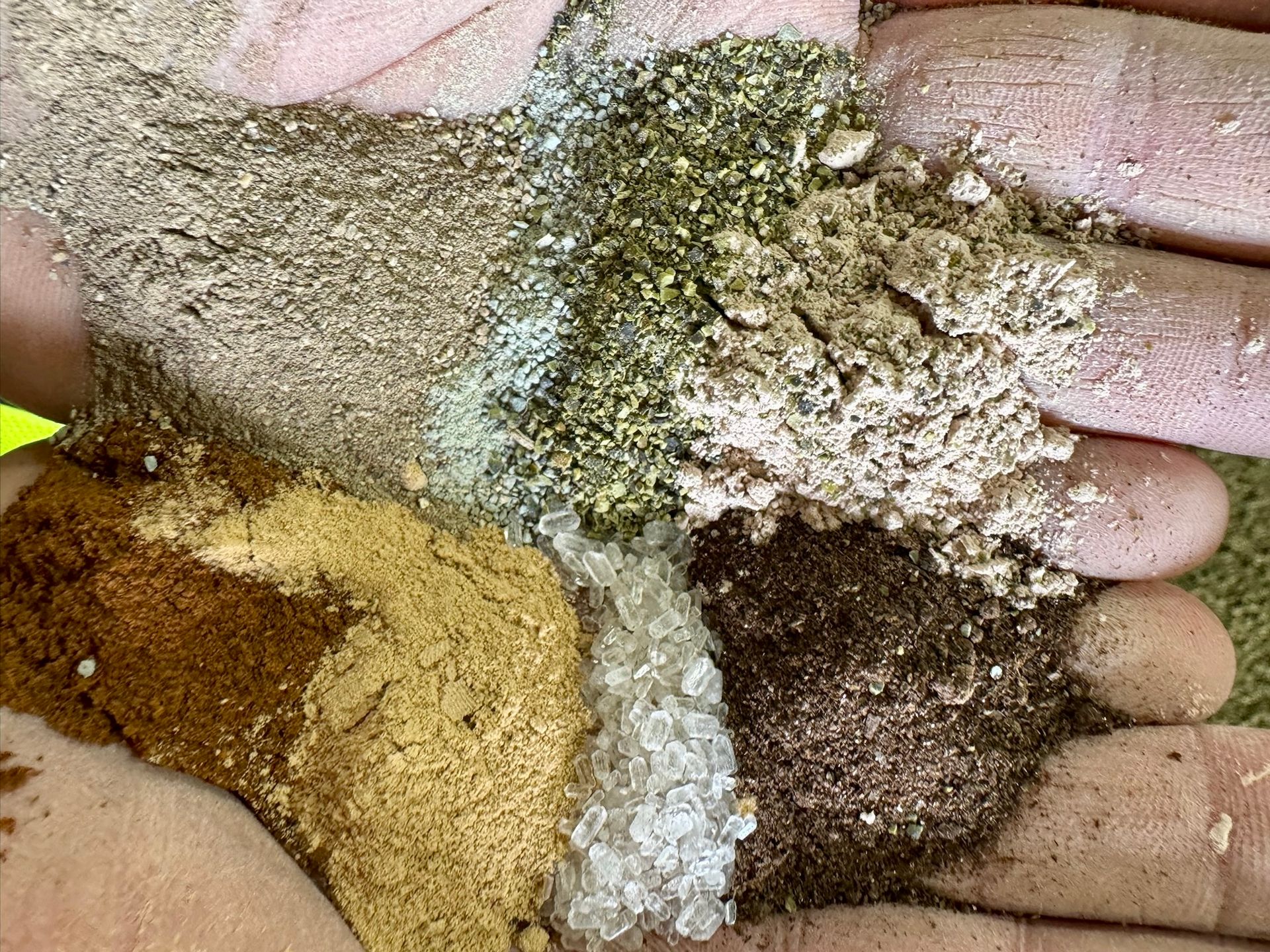Comparing fertilizers organic versus synthetic: What you need to know.
Comparing organic versus synthetic fertilizers: What you need to know.
When it comes to fertilizing your garden or farm, the choice between organic and synthetic fertilizers can be overwhelming. Both options have their merits and drawbacks, making it essential to understand how they impact various aspects of plant growth and soil health. In this blog post, we’ll delve into the benefits and disadvantages of each type of fertilizer, focusing on key factors like soil health, nutrient runoff, plant health, and more.
Plants themselves do not know the difference between organic and synthetic fertilzier as they take up all nutrients in a chemical form. However, the difference is the impact these different forms of fertilizer have on the long term health of the soil biome, think probiotics for the soil, as well as the soil sturcture.
1. Soil Health
Organic Fertilizers:
Organic fertilizers, are derived from natural sources such as plants, animals, and minerals. They improve soil health by enhancing its structure and promoting beneficial microbial activity. Being rich in organic matter, they help to retain moisture and provide a habitat for beneficial microorganisms. This contributes to a healthier soil ecosystem, promoting nutrient cycling and supporting plant growth.
Synthetic Fertilizers:
While synthetic fertilizers are designed to provide immediate nutrients, they can lead to soil degradation if used excessively. Over time, reliance on synthetic options can deplete the soil of organic matter, negatively affecting its health and structure.
Conclusion:
Organic fertilizers tend to promote long-term soil health, while synthetic fertilizers can lead to short-term gains at the potential cost of soil quality.
2. Soil Biome
Organic Fertilizers:
One of the standout benefits of organic fertilizers is their ability to support a diverse soil biome. They encourage the growth of beneficial microbes, fungi, and earthworms, all of which play a vital role in nutrient cycling and disease resistance.
Synthetic Fertilizers:
Synthetic fertilizers do not provide the same level of support for soil microorganisms. While they can enhance nutrient uptake in the short term, they do not contribute to the overall health of the soil biome.
Conclusion:
Organic fertilizers foster a thriving soil biome, while synthetic fertilizers may not promote microbial diversity as effectively.

3. Nutrient Runoff
Organic Fertilizers:
Organic fertilizers generally release nutrients gradually, reducing the risk of nutrient runoff during heavy rainfall. This slow-release nature helps ensure that plants absorb the nutrients effectively without overwhelming the soil. The nutients also remain available to the plants over a longer period of time.
Synthetic Fertilizers:
On the other hand, synthetic fertilizers can lead to significant nutrient runoff, particularly if applied in excess. This runoff can contaminate waterways, causing problems like algal blooms and harming aquatic ecosystems.
Conclusion:
Organic fertilizers are less likely to contribute to nutrient runoff, making them a more environmentally friendly choice.
4. Soil Structure
Organic Fertilizers:
Organic amendments improve soil structure by enhancing aeration and water retention. A well-structured soil with good drainage allows for better airflow, which is essential for healthy root growth. A robust root system helps plants access nutrients and water more effectively, improving their resilience to stress. Healthier plants are often more resistant to diseases and pests due to their improved physiological state. This resistance can lead to reduced reliance on chemical pesticides.
Synthetic Fertilizers:
Synthetic fertilizers do not contribute to soil structure in the same way. While they provide essential nutrients, they can lead to compacted soil over time, especially with repeated use.
Conclusion:
Organic fertilizers significantly enhance soil structure, while synthetic options may contribute to compaction.

5. Plant Health
Organic Fertilizers:
Plants grown with organic fertilizers often exhibit better overall health. They are more resilient to pests and diseases due to the balanced nutrient profile and improved soil conditions.
Synthetic Fertilizers:
While synthetic fertilizers can promote rapid growth, they may lead to imbalances in nutrient uptake, making plants more susceptible to diseases and pests in the long run.
Conclusion:
Organic fertilizers tend to support healthier plants, while synthetic fertilizers may compromise plant resilience over time.

6. Nutrient Uptake
Organic Fertilizers:
The slow-release nature of organic fertilizers allows for steady nutrient uptake by plants. This gradual process helps prevent nutrient leaching and ensures that plants have access to nutrients when they need them.
Synthetic Fertilizers:
Synthetic fertilizers provide a quick nutrient boost, which can be beneficial for immediate needs. However, this quick release can lead to nutrient leaching, especially during heavy rains.
Conclusion:
Organic fertilizers promote more sustainable nutrient uptake, while synthetic options can lead to rapid but temporary gains.
7. Disease Resistance
Organic Fertilizers:
Healthy soil, enriched with organic fertilizers, contributes to stronger plants that can fend off diseases more effectively. The diverse microbial community plays a significant role in enhancing plant defenses.
Synthetic Fertilizers:
While synthetic fertilizers can support plant growth, they may not contribute to the same level of disease resistance. Plants that grow rapidly with synthetic inputs can become vulnerable if not managed properly.
Conclusion:
Organic fertilizers generally help build disease resistance in plants, whereas synthetic fertilizers may leave plants more exposed to threats.
8. Reduced Chemical Dependency
Organic Fertilizers:
Organic fertilizers typically contain fewer synthetic chemicals, making them a safer choice for both the environment and human health. They promote a more sustainable agricultural model that reduces chemical dependency.
Synthetic Fertilizers:
Synthetic fertilizers can lead to chemical dependency, as they provide immediate nutrients but may not support the soil’s long-term health. This dependency can result in diminishing returns over time.
Conclusion:
Organic fertilizers support reduced chemical dependency, promoting a more sustainable approach to agriculture.
Final Thoughts
In conclusion, both organic and synthetic fertilizers have their place in agriculture and gardening. Organic fertilizers excel in enhancing soil health, supporting a diverse soil biome, and promoting long-term sustainability. In contrast, synthetic fertilizers offer quick nutrient delivery but can lead to environmental issues and soil degradation if used improperly.
By understanding the advantages and disadvantages of each, you can make informed decisions that benefit both your plants and the environment.

